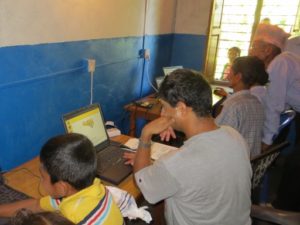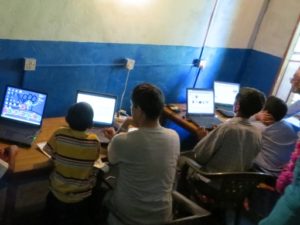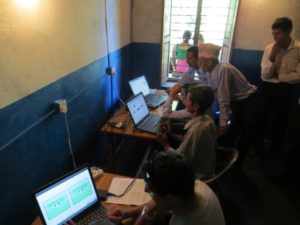Duradanda, Lamjung District
Kids on Computers® volunteers, in a partnership with CHOICE Humanitarian, traveled to Nepal in 2013. There we established two computer labs in Duradanda, a Village Development Community (VDC) in central Nepal’s Lamjung District. A Kids on Computers® volunteer was familiar with Choice Humanitarian and had previously done a humanitarian trip to Nepal as part of Choice Humanitarian.
Discussion between Kids on Computers® and Choice Humanitarian began early in 2013, planning for a joint venture to a Nepal location where Choice Humanitarian already had a presence. The Kids on Computers® board of directors approved the plan and coordinated with Choice Humanitarian to arrange the September trip.
Each organization had an objective for the trip. Kids on Computers® wanted to establish computer labs in two Duradanda schools which had met our criteria for new computer labs. Choice Humanitarian wanted to apply tablet technology to help surveying rural populations regarding health, education, community and other issues in the Nepalese area where they were active.
At that time Kids on Computers® had tablets as a result of a donation of 100 HP TouchPad tablets the previous year. The board of directors approved of Choice Humanitarian’s planned application and agreed to Choice Humanitarian’s request for 25 tablets configured for their needs. Kids on Computers® agreed to install an Android operating system onto the tablets and otherwise configure it for use in Choice Humanitarian’s program. The Kids on Computers® volunteers carried eight laptops and eight tablets to Nepal. The rest of the tablets were carried by Choice Humanitarian volunteers a few weeks later.
Sarbodaya College
Sarbodaya College is a small but growing school in Duradanda VDC. This college serves as a technical/trade school for Nepali students who are seeking to develop specific skills beyond high school to help with employment and agriculture technique. Kids on Computers® placed four laptops in this school in September 2013. Before receiving these laptops, Sarbodaya had only two non-functional Windows desktop PCs.
Each laptop Kids on Computers® provided is configured with Anti-X Linux 13.1, and includes math and typing tutors from Tux4Kids, the LibreOffice suite, Gimp, Chromium web browser, and several other open source apps. Although Internet access is available in the area, networking withing the computer rooms of these schools is not yet complete. Even without Internet access, each laptop also provides offline Wikipedia and/or Khan Academy video content (as space permitted).
A 20 minute walk uphill (north) from Sarbodaya is Duradanda High School, a larger school serving kids from nursery up to 10th grade. This school was recently completed by collaboration of several organizations, including CHOICE Humanitarian. Shortly before we arrived, Duradanda had received a donation of desktop computers from an organization in Asia, and students are beginning to use these computers as part of their curriculum. Krishna Ghimire, the computer teacher for Duradanda, helped us set up the laptops in Sarbodaya and has agreed to be our point of contact for maintenance. Thanks Krish!
Although we didn’t set up any new laptops at Duradanda High School, we were happy to share the offline Khan Academy content. KoC left a 16GB USB flash drive with Krishna, containing a copy of the Khan Academy math and science videos prepared for offline use by World Possible’s RACHEL project (12GB). Krishna already has Chrome browser installed on the computers at Duradanda, so they will work great to play back the HTML 5 videos in the computer lab.
Panini Sanskrit Secondary School



Panini Sanskrit Secondary School is about a 30 minute “walk” to the west from Sarbodaya College. The school in this community has a goal to preserve and teach cultural traditions and values, including classical Sanskrit.
Four laptops were setup in Panini Sanskrit Secondary School, each running Anti-X Linux 13.1. Educational apps like TuxMath, TuxType, and GCompris are installed, along with Libre Office, and several other open source apps. On the laptops with enough disk space, we installed a copy of offline Khan Academy videos and offline Wikipedia as well.